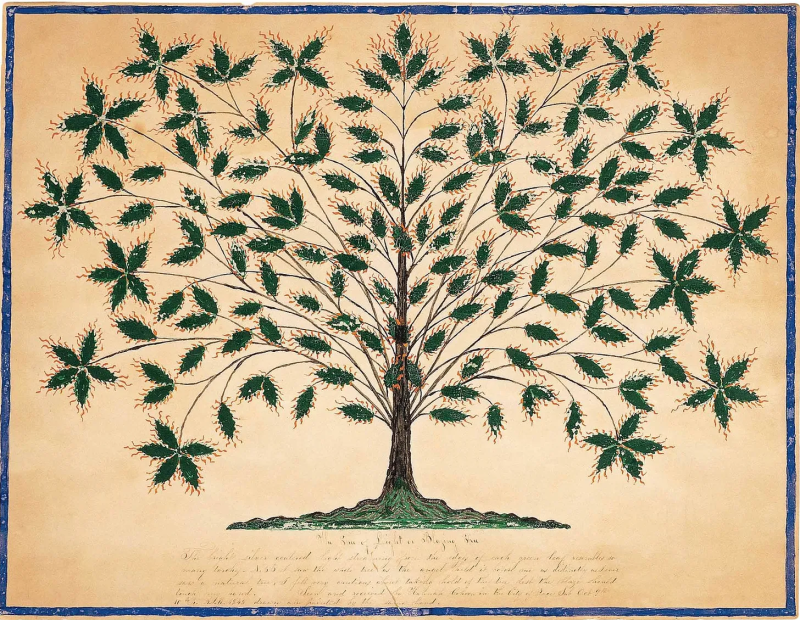To Celebrate Simple Gifts
by Robert Malone at Brownstone Institute


‘Tis the gift to be simple, ’tis the gift to be free
‘Tis the gift to come down where we ought to be,
And when we find ourselves in the place just right,
‘Twill be in the valley of love and delight.
When true simplicity is gained,
To bow and to bend we shan’t be ashamed,
To turn, turn will be our delight,
Till by turning, turning we come ’round right.“Simple Gifts” is a Shaker song written and composed in 1848, generally attributed to Elder Joseph Brackett from Alfred Shaker Village.
We are constantly surrounded by messages and narratives that separate us from each other, from family, from community, from our very souls. Chronic promotion of fear and division. Us against them. The importance and primacy of “career.” Competitive striving for personal “success” and “achievement” and the chronic self-promotion that fuels envy. Overlaying all of this is the impact of the dark arts of modern media; propaganda, intentional psychological manipulation for various purposes, selective promotion of politicized narratives, and targeted defamation of those who think and speak differently from that which is approved and endorsed by political and corporate elites.
No wonder sales of legal Marijuana and the use of illegal Fentanyl are skyrocketing! These are clear indications of a society in crisis, of a broad segment of the populace experiencing disaffection, anguish, and psychological pain. Retail cannabis sales are projected to be upwards of $53.5 billion by 2027. (Source: Projected US legal medical and recreational cannabis market size). Gen Z and Millennials make up 62.8% of all US cannabis sales. (Source: 2024 Marijuana Industry Statistics). Tax revenue generated from recreational marijuana sales is substantial, with Illinois generating over $417 million in 2023.
State-sponsored “Medical Assistance in Dying” (MAID), more bluntly known as pharmaceutical suicide, is going mainstream throughout the Western world.
At the center of the “Mass Formation” hypothesis, which seeks to understand and predict the social conditions that give rise to the madness of crowds and the psychological basis for totalitarianism, is the idea that disillusionment, social fragmentation, and lack of meaning in one’s life give rise to a psychological state in which individuals become very susceptible to suggestion and manipulation; in essence, these conditions can enable a form of group hypnosis by authoritarians.
Of course, the rise of meaningless paid labor, otherwise known as bullshit jobs, further exacerbates this lack of meaning and has become a blight on humanity. What else would anyone expect? Having wrapped your mind around these observations, now imagine the impact of “universal basic income” policies and programs.
All of this messaging and propaganda reinforces the idea that your self-worth is defined by your career achievements, and your comparators for defining personal success are viral social media influencers and promoted celebrities. And that the world owes you a living; you are not responsible for your state of affairs. No wonder Gen-Z and millennials are trying to numb their minds with pot in record numbers.
Keep in mind that modern PsyWar is just the latest stage in the development of marketing, propaganda, and censorship technology, and that this suite of technologies has been evolving since the dawn of human society. When podcasting or lecturing on PsyWar, the information often overwhelms listeners and audiences. Nudge. Psychological Bioterrorism. Fifth-generation warfare. Surveillance Capitalism. The censorship-industrial complex. Techno-totalitarianism. Debanking and weaponization of finance.
Words and concepts help enable understanding by defining and describing technology categories, but it all fuses into a powerful aggregate beast that relentlessly seeks to control all information that you can access and all thoughts, beliefs, and emotions that you experience. To control your soul. But, if we can be quiet and listen, we can hear that our souls know they are being manipulated, and they don’t like it very much. Abuse of mind-numbing drugs and suicide are two ways to escape the manipulation.
What are the alternatives? What can individuals (or souls) do to remain free and autonomous when surrounded by these manipulative methods?
We are so focused on the future, on the irresistible flowing tide of information, media, technology, and consequent “future shock,” that we often fail to recognize the simple things. These simple gifts are our collective inheritance, and they offer simple solutions to combat the PsyWar and conditions that empower those seeking to exploit the psychological precursors of “mass formation” for their purposes.
Often asked, “What can we do to avoid the effects of PsyWar?” my answer is simple. You, we, become more vulnerable to these methods when we lose connections with the natural, physical world and to each other. The mass formation process, the madness of crowds, and mass hypnosis are a direct consequence of becoming isolated from each other, losing a sense of meaning and purpose, and developing anxiety and anger about our isolated, meaningless lives. So what can be done? Recommit to family, friends, community, faith in God, or a higher purpose.
Humans are social animals. We have a fundamental need to form communities and to feel connected to others. Reject hatred and division. Start talking to each other, even those that seem to be different or do not share your politics or point of view.
And find meaningful work. In my experience, there is nothing more satisfying and centering than actually completing a physical task. There is a strange promoted logic that physical labor is demeaning and that the objective of technology is to free us from performing physical labor. In my experience, this is not a pathway to happiness or finding meaning in life. I am again reminded of Voltaire’s seminal 1759 philosophical novella Candide, which profoundly impacted my view of the world.
In Candide, the character Dr. Pangloss, a professor of “metaphysico-theologo-cosmolonigologie,” teaches his students, including Candide, that they live in the “best of all possible worlds.” This philosophical concept, attributed to Gottfried Wilhelm Leibniz, suggests that God, being all-powerful and benevolent, created the world in the most optimal way, with every event and circumstance serving a greater good.
The novella concludes with Candide’s mentor, Pangloss, imprisoned and mutilated, while Candide himself is left to reflect on the futility of the philosophy of optimism. Voltaire’s final message, “We must cultivate our garden,” suggests that individuals should focus on productive labor, as well as their own well-being and happiness, rather than relying on grand philosophical systems or divine providence.
The Shakers, actually named the United Society of Believers in Christ’s Second Appearing, were a millenarian restorationist Christian sect founded 1747 in England and then organized in the United States in the 1780s. Their monkish celibacy and lifestyle preordained the eventual demise of this philosophy, but their relentless focus on simplifying their lives and the objects around them offer a role model that may inform those looking for meaning and a more centered way of living in the 21st century.
Shakers believed in living simply, rejecting excessive ornamentation and luxury. They emphasized the importance of honesty, utility, and functionality in design and craftsmanship. Shakers believed in gender and racial equality, with women playing active roles in leadership and decision-making. Shakers were pacifists, rejecting violence and war as means of resolving conflicts. Shakers emphasized the importance of community and cooperation, working together to achieve common goals and share resources. Shakers were innovators, developing new technologies and designs for furniture, tools, and other practical applications. And Shakers prioritized function over form, designing objects that were both beautiful and functional.
There is nobility and meaning in physical labor, and in creating physical, functional objects. I was a carpenter and farmhand before I became a physician and scientist by pulling up my own bootstraps. No silver spoons here. With the trend toward increasing fascination and immersion in a virtual world, in which physical reality is treated as an obsolete concept and “reality” and “truth” become fluid products of individual beliefs and perspectives, I find peace and centeredness in simple tasks.
Yesterday it was replacing a ground hydrant that had frozen and cracked. A miserable task involving digging in rocky soil, cold water, and icy conditions. And when the work was completed, I was filled with a sense of peace and purpose.
Today it is writing this essay and replacing a leaking water heater.
What a wonderful gift, to have the opportunity to work with my hands (and mind), and to experience the satisfaction of a job well done.
I hope you will join me in celebrating the nobility of physical labor. To pass through this time of testing, to overcome the forces of evil, their self-serving plans, and their abusive psychological manipulation methods, my humble recommendation is to recommit to family, friends, community, and faith in something greater than yourself.
Cultivate your garden. Value simplicity.
This may not be the best of all possible worlds, but by working together, I am confident that we can make it better.
Republished from the author’s Substack
To Celebrate Simple Gifts
by Robert Malone at Brownstone Institute – Daily Economics, Policy, Public Health, Society
Disclaimer
Some of the posts we share are controversial and we do not necessarily agree with them in the whole extend. Sometimes we agree with the content or part of it but we do not agree with the narration or language. Nevertheless we find them somehow interesting, valuable and/or informative or we share them, because we strongly believe in freedom of speech, free press and journalism. We strongly encourage you to have a critical approach to all the content, do your own research and analysis to build your own opinion.
We would be glad to have your feedback.
Source: Brownstone Institute Read the original article here: https://brownstone.org/

